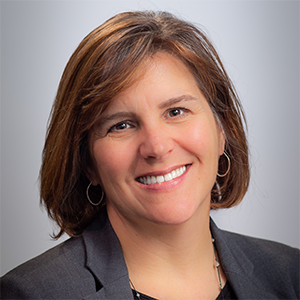It all started with her own questions about how young students were learning about sexual health. One question after another led to Elizabeth Dickson, PhD, RN, an assistant professor at The University of New Mexico College of Population Health with a secondary appointment at the UNM College of Nursing, to become an instrumental voice in addressing critical gaps in sexual health education for young people.

When it comes to sexual health education, young people's voices need to be centered, because I think too many adults think we have to make these decisions without talking to the people—the students—who they actually want to be working with, and (students) really do understand what's going on. They are the experts in their own lives.
With a background as a public health nurse, Dickson’s career spanned county, state, and federal public health agencies before she joined UNM as faculty in 2018.
“It was my work that I was doing in school spaces as a school nurse, and as a provider in school-based health centers—that led me down the road to coming back and getting my PhD and wanting to do research focused around young people, specifically access to sexual health services and education,” Dickson said.
Dickson initially took a faculty appointment at the College of Nursing at UNM but was later invited to join the College of Population Health. This transition allowed her to expand her research and work closely with colleagues at the Center for Participatory Research.
“I straddled those worlds of nursing and public health anyway, so having a chance to come over and join the expansion of the College of Population Health that happened last year was really exciting. And I’m still connected to and very grateful for my colleagues at the College of Nursing,” Dickson remarked.
During her tenure with the New Mexico Department of Health, Dickson observed firsthand the lack of comprehensive sexual health education in schools. She noted, “when I was working with the Department of Health, I was actually a school-based health center provider, and I was pulled in to teach sexual health education in the schools where I was working—in both middle and high schools—and over and over again I just became very aware that this was often the first time that a lot of students had this conversation in the school setting.”
Driven by the realization that many students were receiving inadequate sexual health education, Dickson embarked on a journey to understand and improve the situation. Her inquiry led her to Santa Fe, where she engaged with policy leaders to uncover the extent of oversight and accountability in sexual health education.
“It was my understanding that it was actually required by the state for students to have some form of sexual health education, so my inquiry path started out here in Albuquerque Public Schools, but led me to Santa Fe and talking to policy leaders up at the Roundhouse to find out things like what was expected, how was their oversight handled, if there was accountability for how all this content was being taught. It just wasn't anything that I knew, and it was very enlightening because more often than not, I heard people say, ‘well, we just don't know what's being taught, there's not really oversight. It’s a box checked on a form and a report somewhere from each school district.’”
Dickson’s commitment to improving sexual health education led her to pursue a PhD at UNM, focusing on health policy.
“That's what led me to go back and get my PhD at UNM, because I wanted to learn how to do research to answer the questions that I had and that clearly we didn't have information for here in New Mexico,” Dickson explained.
Her doctoral studies, supported by a fellowship from the Robert Wood Johnson Foundation, connected her with national experts in sexual health education research, health policy, and advocacy.
Through her dissertation, Dickson conducted extensive research, including 122 interviews with teachers, school nurses, and administrators across New Mexico. She investigated the state of sexual health education, identifying who was teaching it, how it was being taught, and the barriers to its effective delivery.
“Quite honestly we didn't know who was teaching it, and if it was taught, we didn't know how it was being taught or what the expectations were, or what the barriers were to it being taught at all in some schools,” Dickson noted.
Her findings highlighted the need for standardized, comprehensive sexual health education, especially in rural communities where cultural, historical, political, and religious factors influenced education. Dickson’s research revealed that students themselves were eager for better sexual health education.
“More often than not, students acknowledge that yes, we do need this, we want this in school. We don't get this anywhere else, and we know we have access to a ton of stuff online, but it isn't always accurate,” she shared.
In response, Dickson launched the Advancing Sexual Health Education Through Youth Engagement (SHE) project, funded by a fellowship from the Moore Foundation through the University of California Davis. The project, in collaboration with Project ECHO and the Responsible Sex Education Institute with Planned Parenthood, aims to train educators and school health staff to improve their skills and knowledge in teaching sexual health education.
SHE’s unique approach includes involving youth advisors—aged 18 to 21—who contribute their insights and experiences to shape the project.
“The really unique part of SHE is including a group of youth advisors who are helping to advise this project. They are the subject matter experts, as the people whose lives this is going to impact the most,” Dickson emphasized.
The project also focuses on creating a supportive community of practitioners who can learn from each other. “The training for educators is about being able to comfortably talk about this subject matter and to navigate questions and facilitate conversations among students. It's a unique skill set that if you haven't had a chance to learn how to do that well… it could go really sideways in a classroom, and it can end up causing more harm than good,” Dickson explained.
As SHE progresses, Dickson is optimistic about its impact.
“As we go through this first year, I anticipate we're going to see lots of really positive increases in knowledge and skills and comfort and confidence with teaching sexual health education,” she said.
Dickson’s ultimate goal is to enhance schools’ capacity to provide effective sexual health education, ensuring students receive the information and support needed to make informed decisions.
“The big dream is to increase the capacity and ability for people in schools who are working with young people around sexual health education—to provide the support and information the students need to make the best decisions they can for themselves,” she stated.
Dickson believes that including young people's voices in the conversation is crucial.
“When it comes to sexual health education,” Dickson states, “young people's voices need to be centered, because I think too many adults think we have to make these decisions without talking to the people—the students—who they actually want to be working with, and (students) really do understand what's going on. They are the experts in their own lives. You really need to include them in the conversation, because they have a lot of brilliant, creative, wonderful ideas about how to do this work really, really well.”